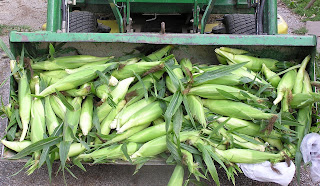"
Pleasant words are as honeycomb, sweet to the soul."
(Proverbs 16:24)
Earlier I wrote about our adventures with the 2008 honey harvest... it was basically uneventful... no stings, no angry bees, an easy time essentially getting the supers from the hives. And if you recall we found that our honey harvest was less than we had hoped (I also wrote about some speculations about the reason that happened). After we got the frames into the honey house (i.e., our basement!) we discovered that not all the honey was capped and in fact some of it still had too much water content. If honey is extracted with too much moisture it easily ferments... not a problem if you're trying to make mead, but if your aim to sell honey... well, one's customers might frown. So my husband cleverly came up with a dehydration-station. A make-shift room made out of a shower, a dehumidifier and a bunch of shower curtains / plastic. After a week the honey was well within the specs to harvest. So last weekend we extracted the honey from the frames. Above you can see my husband using an electric uncapping knife to remove the caps of wax over the honey. The
cappings fall into the uncapping tank (which is a bi-layered "tank" that allows the honey attached to
cappings to fall below - some say that the capping honey is the sweetest - I tend to agree). After the frames have been uncapped,
I placed them in the extractor. We have been blessed with a large 20 frame motorized radial extractor. It makes the work of extracting super easy. I remember when I first saw our friends extract honey. They have a nice manually operated tangential extractor. They would turn the crank as fast as they could for (what seemed to me) to be a long time. Then they would turn the frames around and do the whole process again.... a great work out.... but I'm too old for that kind of work (at least that's the excuse I'm giving today!)

So anyway, I put the frames in the extractor and tried to balance their weight so the whole machine doesn't walk the floor like a washing machine out of balance. We close the lid, turned the motor and watch the honey "spray" out of the frames. A few minutes later we slowed the motor down and then spun them the other way. The whole extracting process probably took only 5-10 minutes (with
no sweating or achy joints involved!).
The honey was strained using a double stainless steel strainer. The strainer gets most of the wax, bees debris and stuff that was on the frames out of the honey. Then the honey is stored in big 5-6 gallon honey containers and left to settle for a few days. The extracting process allows some air into the honey and if one were to bottle this new extracted honey there would be a bunch of air bubbles in the containers.

So since today is a very rainy day and I can't pick beans, squash, or raspberries and it is certainly way to muddy to be weeding the
strawberries, I thought today would be a good day to bottle the honey. It's not difficult but it sure is sticky and sweet (of course I have to sample the "drips"). I simply grab one of our bears and open the honey gate and fill the bear. The process just repeats until the honey in the container is drained. Sometimes the children help me but today I did it myself.
We bottle Papa (16 oz.), Mama (12 oz.), Brother (8 oz.) and Baby (6 oz.) Bears. I placed the fall honey next to the spring honey to show the differences in color. The spring honey (we call "apple blossom honey") is much lighter than the fall honey (we call "autumn gold honey"). The last picture is one of the whole "family." We hope to sell some of it this year. Usually all I have to say is something like "Local honey makes a great and unique stocking stuffer." Sometimes I remind potential customers that this honey is from our hives which have no chemicals or harsh treatments (like many commercial honeys) and that since it is local they would be supporting their local economy. If they suffer from allergies I also remind them that research shows that local honey may help their symptoms.

Selling honey is not the only reason why we have become beekeepers. It just seems like the right thing to do. The berries need pollination and the bees make many products (honey, comb, pollen,
propolis and wax). They have an amazing structure to their colonies. Perhaps one day I'll write about the many life lessons I have learned from watching their behavior.
God made an amazing insect with amazing abilities. And throughout history honey has been a valued and sought after
commodity. Remember the
Israelites? God promised them a land flowing with milk and honey... sounds like a good recipe for ice cream to me!

Today's journey joy - Autumn Gold Honey
 I praise you because I am fearfully and wonderfully made; your works are wonderful, I know that full well. My frame was not hidden from you when I was made in the secret place. When I was woven together in the depths of the earth, your eyes saw my unformed body. All the days ordained for me were written in your book before one of them came to be." Psalm 139: 14-16
I praise you because I am fearfully and wonderfully made; your works are wonderful, I know that full well. My frame was not hidden from you when I was made in the secret place. When I was woven together in the depths of the earth, your eyes saw my unformed body. All the days ordained for me were written in your book before one of them came to be." Psalm 139: 14-16.jpg)



























